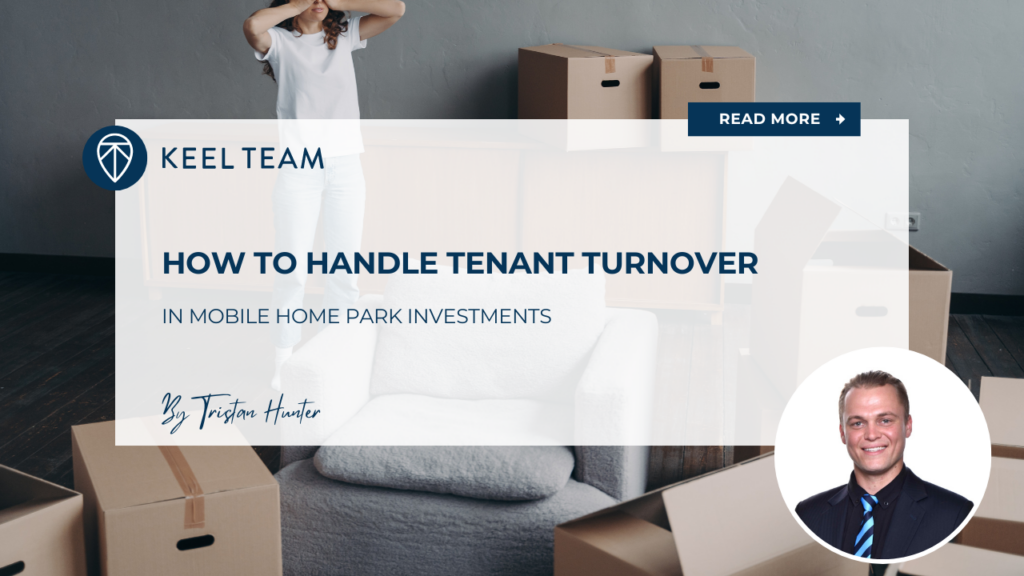How to Handle Tenant Turnover in Mobile Home Park Investments
-
 Tristan Hunter - Investor Relations
Tristan Hunter - Investor Relations

Managing tenant turnover efficiently can be essential for maintaining the profitability of mobile home parks. On average, tenant turnover rates in mobile home parks range between 5% to 15% annually, which is significantly lower than traditional apartments, where rates can be as high as 50-60%. However, when turnover does occur, it’s important to minimize vacancy duration, prepare units quickly, and efficiently screen new tenants to maintain occupancy levels. Here’s how you can do that effectively.
1. Minimize Vacancy Duration with Proactive Marketing
Proactive marketing can be key to minimizing vacancies. Start advertising the unit as soon as you receive notice from the departing tenant. Research shows that mobile home park residents often stay long-term because the cost to move a mobile home can average at around $5,000, which is a deterrent to frequent relocation.
Utilize online platforms like Craigslist, Facebook Marketplace, and industry-specific websites to reach a wider audience. Emphasize community features and affordability, which are major attractions for mobile home park residents. By building interest before the unit is vacant, you can increase the chances of securing a new tenant quickly.
2. Offer Early Lease Signing Incentives
To encourage quick lease signings, consider offering incentives like a reduced deposit or the first month free. Studies show that trailer parks offering such benefits can reduce their vacancy time by attracting tenants actively searching for homes.
Additionally, implementing a referral program for existing tenants can help fill vacancies faster. When current residents refer new tenants, they help fill spots quickly and also contributes to a more cohesive and stable community.
3. Prepare Units Quickly for New Occupants
Quick unit preparation can be important for reducing downtime. Mobile home parks often have lower turnover maintenance costs compared to traditional rentals since tenants own their homes and handle interior maintenance themselves. However, the mobile home park owner is typically responsible for ensuring that the lot and communal areas are ready.
Consider having a maintenance team ready to clean and repair units as soon as a tenant vacates. Common tasks might include inspecting utility hookups, landscaping, and ensuring that infrastructure (like roads and lighting) is functioning properly. A streamlined checklist helps speed up the process, making the unit available for viewing sooner.
4. Implement an Efficient Tenant Screening Process
Effective tenant screening can be essential to avoid frequent turnover. Mobile home parks generally have more stable tenant bases due to the high costs of relocation; still, thorough screening is crucial.
Consider using an online application process to gather details like income verification, rental history, and references. Automated tools can help streamline background checks, helping you make faster, data-driven decisions.
However, ensure compliance with fair housing laws during the screening process. A consistent, non-discriminatory approach minimizes legal risks and helps you secure reliable tenants who fit your community’s culture and values.
Download our FREE eBook on the Top 20 things to know BEFORE investing in mobile home parks!
5. Use Technology for Streamlined Management
Modern technology can simplify the management of tenant turnover. Property management software tracks lease expirations, monitors maintenance schedules, and automates marketing efforts. These tools can allow you to respond quickly when tenants provide notice, helping ensure you maintain high occupancy levels.
Virtual tours and online listings also broaden your reach, enabling potential tenants to explore the property without a physical visit. This approach helps attract local residents and also appeals to tenants relocating from other regions, potentially filling vacancies faster.
6. Build a Strong Community to Retain Tenants
Retention is one of the most effective ways to handle tenant turnover. Mobile home parks with strong community ties often have lower turnover rates because tenants feel a sense of belonging. In fact, reports indicate that the average mobile home tenant stays for around 10 years in a well-managed trailer park.
Consider community events, maintain common areas, and regularly engage with residents to foster this sense of belonging. When tenants feel valued and connected, they are more likely to stay long-term, reducing turnover rates and the associated costs.

7. Evaluate Rent Prices Regularly
Keeping rent competitive can be essential for maintaining high occupancy rates. Mobile home parks typically offer affordable housing, which remains attractive even during economic downturns. However, if your rates are significantly higher than nearby trailer parks, it may cause tenants to leave.
Conduct market research to ensure your prices align with the local market. Adjust rents gradually to avoid sudden spikes that may lead to higher vacancy rates. Flexible payment options, like bi-weekly or weekly payments, can also help tenants manage finances better, reducing eviction risks and turnover.
8. Monitor Tenant Satisfaction
Monitoring tenant satisfaction can be a proactive way to reduce turnover. Regularly survey tenants to gather feedback about their experience in the trailer park. Use the feedback to make improvements, showing that you value their opinions and well-being.
Happy and satisfied tenants are more likely to renew their leases, decreasing turnover rates and creating a stable, thriving community. Investing time in building tenant relationships and acting on their feedback can foster long-term occupancy.
9. Tenant Turnover Rates in Mobile Home Parks
Tenant turnover rates in mobile home parks typically range between 5% and 10% annually for tenant-owned homes, significantly lower than apartment complexes, which experience 40-50% turnover annually.
The lower rates are mainly due to the high costs of moving mobile homes, which can range from $4,000 to $10,000.
Conclusion
Handling tenant turnover in mobile home parks requires a proactive and organized approach. By marketing early, preparing units quickly, and screening tenants efficiently, you can potentially minimize vacancy duration and maintain high occupancy levels. Using these strategies can help reduce costs associated with turnover and also enhance the community’s overall stability. Remember, the key is to stay adaptable and continually refine your processes to keep your mobile home park profitable and thriving.
Book a 1-on-1 consultation with Andrew Keel to discuss:
- A mobile home park deal review
- Due diligence questions
- How to raise capital from investors
- Mistakes to avoid, and more!
Disclaimer:
The information provided is for informational purposes only and is not investment advice or a guarantee of any kind. We do not guarantee profitability. Make investment decisions based on your own research and consult registered financial and legal professionals. We are not registered financial or legal professionals and do not provide personalized investment recommendations.

Tristan Hunter - Investor Relations
View The Previous or Next Post
Subscribe Below 👇





